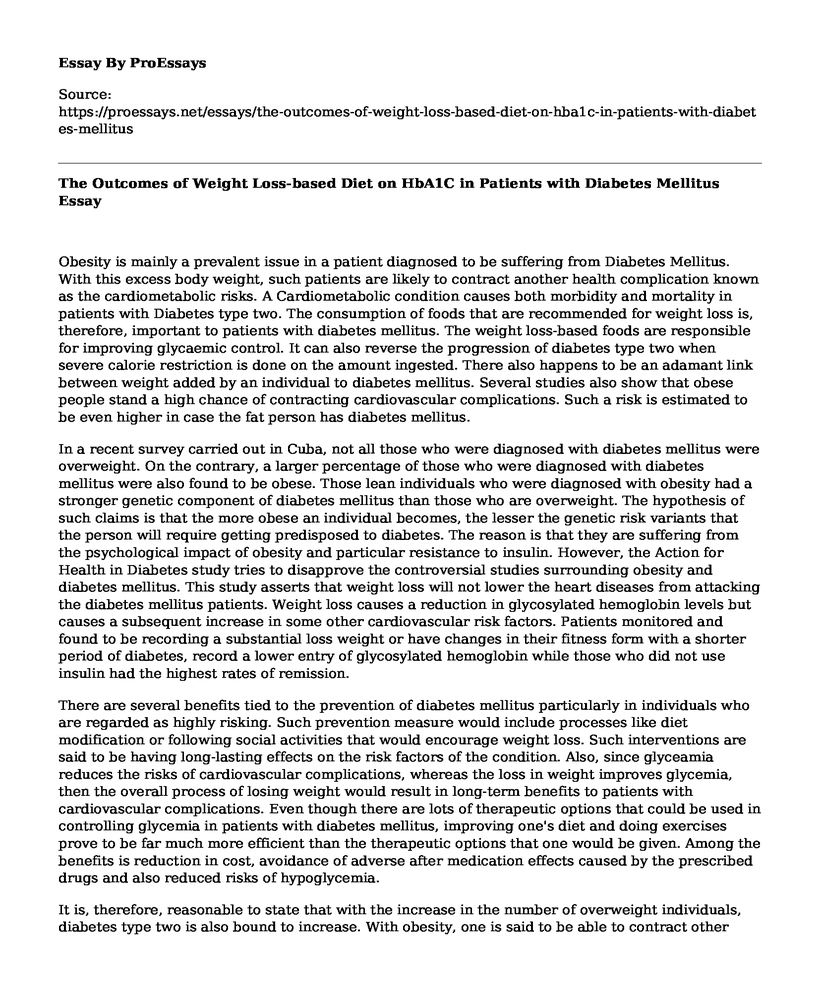Obesity is mainly a prevalent issue in a patient diagnosed to be suffering from Diabetes Mellitus. With this excess body weight, such patients are likely to contract another health complication known as the cardiometabolic risks. A Cardiometabolic condition causes both morbidity and mortality in patients with Diabetes type two. The consumption of foods that are recommended for weight loss is, therefore, important to patients with diabetes mellitus. The weight loss-based foods are responsible for improving glycaemic control. It can also reverse the progression of diabetes type two when severe calorie restriction is done on the amount ingested. There also happens to be an adamant link between weight added by an individual to diabetes mellitus. Several studies also show that obese people stand a high chance of contracting cardiovascular complications. Such a risk is estimated to be even higher in case the fat person has diabetes mellitus.
In a recent survey carried out in Cuba, not all those who were diagnosed with diabetes mellitus were overweight. On the contrary, a larger percentage of those who were diagnosed with diabetes mellitus were also found to be obese. Those lean individuals who were diagnosed with obesity had a stronger genetic component of diabetes mellitus than those who are overweight. The hypothesis of such claims is that the more obese an individual becomes, the lesser the genetic risk variants that the person will require getting predisposed to diabetes. The reason is that they are suffering from the psychological impact of obesity and particular resistance to insulin. However, the Action for Health in Diabetes study tries to disapprove the controversial studies surrounding obesity and diabetes mellitus. This study asserts that weight loss will not lower the heart diseases from attacking the diabetes mellitus patients. Weight loss causes a reduction in glycosylated hemoglobin levels but causes a subsequent increase in some other cardiovascular risk factors. Patients monitored and found to be recording a substantial loss weight or have changes in their fitness form with a shorter period of diabetes, record a lower entry of glycosylated hemoglobin while those who did not use insulin had the highest rates of remission.
There are several benefits tied to the prevention of diabetes mellitus particularly in individuals who are regarded as highly risking. Such prevention measure would include processes like diet modification or following social activities that would encourage weight loss. Such interventions are said to be having long-lasting effects on the risk factors of the condition. Also, since glyceamia reduces the risks of cardiovascular complications, whereas the loss in weight improves glycemia, then the overall process of losing weight would result in long-term benefits to patients with cardiovascular complications. Even though there are lots of therapeutic options that could be used in controlling glycemia in patients with diabetes mellitus, improving one's diet and doing exercises prove to be far much more efficient than the therapeutic options that one would be given. Among the benefits is reduction in cost, avoidance of adverse after medication effects caused by the prescribed drugs and also reduced risks of hypoglycemia.
It is, therefore, reasonable to state that with the increase in the number of overweight individuals, diabetes type two is also bound to increase. With obesity, one is said to be able to contract other health conditions like cardiovascular diseases. However, reducing one's weight is a proper way of managing the diabetic condition. With such weight loss, the positive health impact on the individual diagnosed with type two diabetic conditions will be undeniable.
Reference
Wilding, J. P. H. (2014). The importance of weight management in diabetes mellitus. , 68(6),. Retrieved from https://www.ncbi.nlm.nih.gov/pmc/articles/PMC4238418/
Cite this page
The Outcomes of Weight Loss-based Diet on HbA1C in Patients with Diabetes Mellitus. (2021, Apr 07). Retrieved from https://proessays.net/essays/the-outcomes-of-weight-loss-based-diet-on-hba1c-in-patients-with-diabetes-mellitus
If you are the original author of this essay and no longer wish to have it published on the ProEssays website, please click below to request its removal:
- Provision of OHIP the Psychologists Dealing With the Mentally Ill Paper Example
- How My Mother's Behavior Inspired Me - Essay Sample
- Essay Example on Obama Care in Texas: Potential Issues and Challenges
- Public Health After Natural Disasters: A Case Study of Pakistan Flood 2010
- Preparing African Women for PrEP: Rethinking HIV Prevention - Annotated Bibliography
- Essay Example on COVID-19: Deadly Virus Spread by Droplets & Aerosol Transmission
- Essay Example on Alzheimer's: Dementia, Forgetfulness, and Decline







